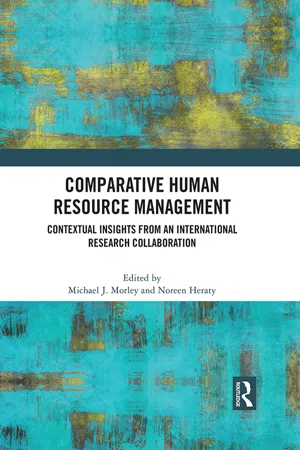
Comparative Human Resource Management
Contextual Insights from an International Research Collaboration
- 128 pages
- English
- ePUB (mobile friendly)
- Available on iOS & Android
Comparative Human Resource Management
Contextual Insights from an International Research Collaboration
About This Book
Context is increasingly recognised as a critical explanatory variable in accounting for commonalities and differences in human resource management. Giving expression to it in research models holds the prospect of enhancing theory development, deepening our appreciation of embedded practices in diverse territories, and opening up new lines of enquiry. However, contextualisation presents a significant research challenge and increasingly, international academic research networks that bring together scholars from different countries in the co-production of knowledge represent a key approach to rising to this challenge.
This volume documents aspects of the development of one such network, namely the Cranet Network on International Human Resource Management, and presents a series of recent contributions from the network. The chapters highlight, inter alia, the limits to convergence in human resource management as a result of contextual determinism, the role of institutional actors, markets, and work regulation in accounting for variations in practices, the contextual specificities and dynamics at play in transition economies, along with key methodological challenges that arise when seeking to build cumulative comparative knowledge via network collaborations of this nature.
The chapters in this book were originally published as a special issue of International Studies of Management & Organization.
Frequently asked questions
Introduction
The Anatomy of an International Research Collaboration: Building Cumulative Comparative Knowledge in Human Resource Management
INTRODUCTION
The problem for researchers from one culture or context wishing to conduct research on another culture is that the outsiders’ past experiences will not have equipped them to make sense of events in the same way that insiders would. (Easterby-Smith and Malina 1999, 84)
BACKGROUND TO THE RESEARCH NETWORK AND DATA COLLECTION
Table of contents
- Cover
- Endorsement
- Half Title
- Title Page
- Copyright Page
- Contents
- Citation Information
- Notes on Contributors
- 1 Introduction: The Anatomy of an International Research Collaboration: Building Cumulative Comparative Knowledge in Human Resource Management
- 2 Context and HRM: Theory, Evidence, and Proposals
- 3 A Comparative Study of Trade Union Influence over HRM Practices in Spanish and Brazilian Firms: The Role of Industrial Relations Systems and Their Historical Evolution
- 4 The Antecedents of Comparative Differences in Union Presence and Engagement: Evidence from Coordinated and Liberal Market Contexts
- 5 Understanding Financial Participation across Market Economies
- 6 Contemporary Human Resource Management Practices in Russia: Flexibility under Uncertainty
- 7 The Cranet Survey: Improving on a Challenged Research-Practice?
- Index